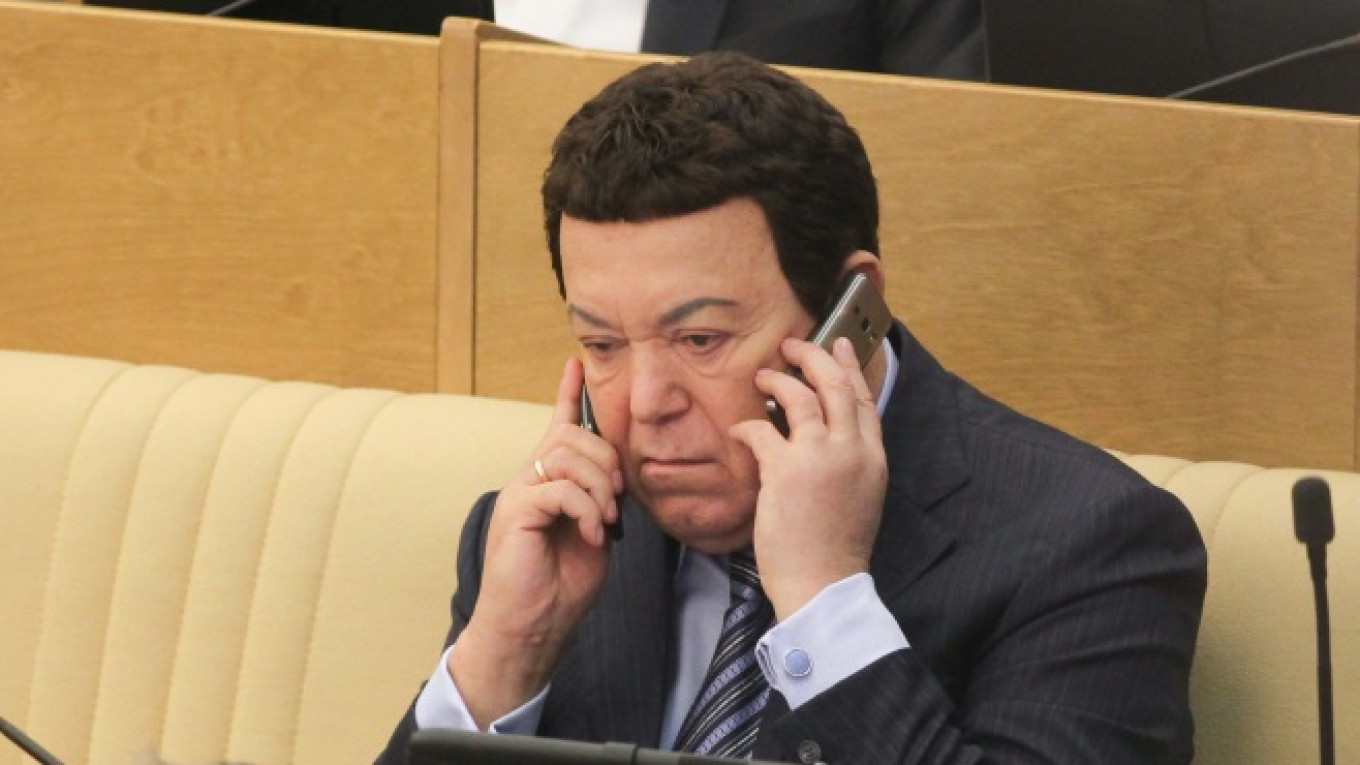Often called “Russia’s Sinatra,” iconic crooner and a longtime parliament member Iosif Kobzon has been vocal in his support for Russia's annexation of Crimea. He claimed that he was grateful and pleased when the European Union put him on a list of sanctioned individuals in February.
Kobzon's attitude is in line with the hardcore patriotic and anti-Western stance adopted and promoted by top Russian officials and most Kremlin-loyal officials.
It is exactly because 77-year-old Kobzon is set to get cancer treatment in Europe after President Vladimir Putin reportedly helped him to lift the ban that many Russian commentators had a particularly angry and bitter response.
“How serious is it? Is conflict between Russia and the West just for fun?” prominent Russian journalist Oleg Kashin wrote in a column for the Slon news website on Monday.
“Yes, it is serious. Yes, everyone's determined. Yes, it's the Cold War. But the borders of this seriousness and determination are marked by a medical visa issued to Kobzon — despite all the seriousness — by the European authorities and, more importantly, requested by the Russian state or, as some say, Vladimir Putin himself,” Kashin wrote.
Many commentators have pointed out that getting an EU medical visa after calling on the Russian authorities on numerous occasions to break off diplomatic relationships with the West is hypocritical at the very least.
This is particularly true considering the fact that Kobzon helped pass a 2012 politically motivated law banning the adoption of Russian orphans by U.S. families, denying many of them a chance to get medical treatment abroad.
Russian Medical Care as Punishment
"If I'm recommended by doctors to undergo surgery in a country that has sanctioned me, I think I'll appeal to the president and he will help me," Kobzon said during an online conference with the readers of the Moskovsky Komsomolets newspaper last month, stirring a bitter public outcry.
Two days later he said it was Putin himself who told him not to hesitate and ask for help if he needed it.
The Ekho Moskvy radio station then conducted a survey in which 82 percent of its listeners said Kobzon shouldn't be allowed to go abroad for treatment.
“He had the opportunity to take pity on us and make our lives better, but he didn't do it. He is getting exactly the same as he gave us,” Mitya Aleshkovsky, a popular Russian blogger and charity activist, wrote on his Facebook page at the time.
“So let him be treated in the Kashirka oncology center [the Blokhin Russian Cancer Research Center located on Moscow's Kashirskoye Shosse]. That's the best punishment for all the suffering he and other [State Duma] deputies have brought on us,” Aleshkovsky concluded.
Despite the criticism, Kobzon obtained the EU medical visa a month later and announced it to the press, not forgetting to mention that the president had helped him.
“I'm grateful to Putin. I obtained a medical visa because of his intervention,” he told the Russian News Service last Friday.
Not a Villain
Kobzon is simply an old man scared by his illness and of dying from it; he is not a villain — during his many years of fighting cancer in Moscow, he helped a lot of ordinary people suffering from the illness, Yekaterina Gordeyeva, author of the book “To Beat Cancer,” wrote in a column for the Meduza news website last month.
“It is not common knowledge that the cancer patient Kobzon helped his '??ompanions in misfortune' a lot,” arranging appointments with the best doctors, buying drugs and equipment, supporting them financially and with morale, Gordeyeva wrote.
His career started during Soviet times, and he climbed the ladder the only way possible at the time — being loyal to certain people, publicly criticizing certain things and serving the ruling elites, she said, so it was only natural of him to ask for their help and protection in return when he needed it most.
At the same time, he's a victim of his own propaganda, State Duma Deputy Dmitry Gudkov wrote on his Facebook page Saturday.
“When Kobzon suggests breaking off diplomatic relations with the U.S. or decries [the Ukrainian government as a] junta — he sincerely believes it. Propaganda hypnotizes not only those who watch television, but also its own masters,” he wrote.
All in all, the situation with Kobzon highlights a deeper problem in Russia — the fact that the “health of a single deputy matters more for our officials than the health of hundreds of unadopted orphans,” Mikhail Vinogradov, head of the Petersburg Politics think tank, wrote on his Facebook page Saturday.
“I think granting Kobzon a visa was the right thing to do — European countries are good at giving lessons in humanity,” he wrote. “It's just that the problem lies on the Russian side, not in Schengen.”
Contact the author at d.litvinova@imedia.ru


